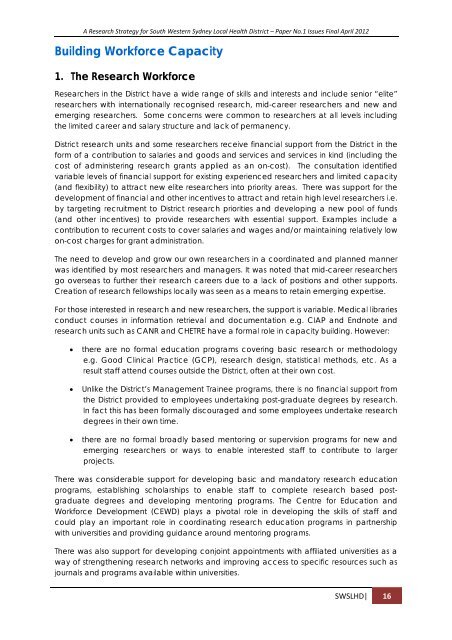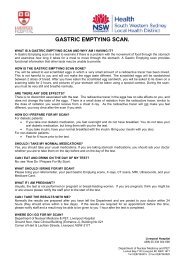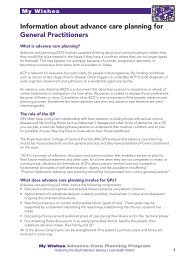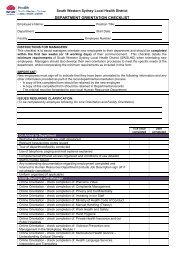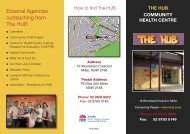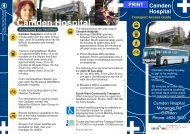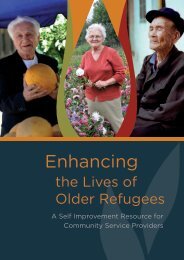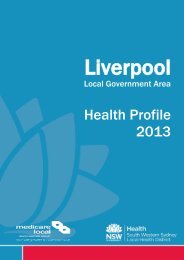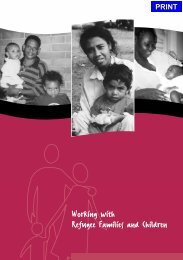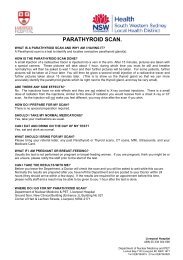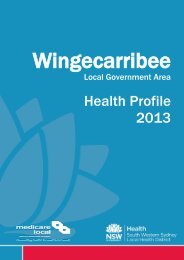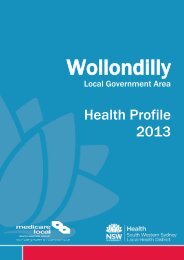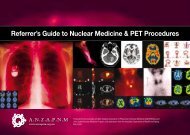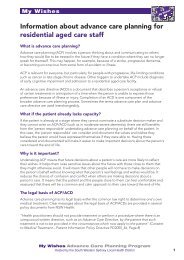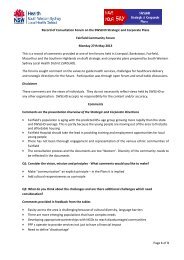Issues Paper - South Western Sydney Local Health District - NSW ...
Issues Paper - South Western Sydney Local Health District - NSW ...
Issues Paper - South Western Sydney Local Health District - NSW ...
Create successful ePaper yourself
Turn your PDF publications into a flip-book with our unique Google optimized e-Paper software.
A Research Strategy for <strong>South</strong> <strong>Western</strong> <strong>Sydney</strong> <strong>Local</strong> <strong>Health</strong> <strong>District</strong> – <strong>Paper</strong> No.1 <strong>Issues</strong> Final April 2012Building Workforce Capacity1. The Research WorkforceResearchers in the <strong>District</strong> have a wide range of skills and interests and include senior “elite”researchers with internationally recognised research, mid-career researchers and new andemerging researchers. Some concerns were common to researchers at all levels includingthe limited career and salary structure and lack of permanency.<strong>District</strong> research units and some researchers receive financial support from the <strong>District</strong> in theform of a contribution to salaries and goods and services and services in kind (including thecost of administering research grants applied as an on-cost). The consultation identifiedvariable levels of financial support for existing experienced researchers and limited capacity(and flexibility) to attract new elite researchers into priority areas. There was support for thedevelopment of financial and other incentives to attract and retain high level researchers i.e.by targeting recruitment to <strong>District</strong> research priorities and developing a new pool of funds(and other incentives) to provide researchers with essential support. Examples include acontribution to recurrent costs to cover salaries and wages and/or maintaining relatively lowon-cost charges for grant administration.The need to develop and grow our own researchers in a coordinated and planned mannerwas identified by most researchers and managers. It was noted that mid-career researchersgo overseas to further their research careers due to a lack of positions and other supports.Creation of research fellowships locally was seen as a means to retain emerging expertise.For those interested in research and new researchers, the support is variable. Medical librariesconduct courses in information retrieval and documentation e.g. CIAP and Endnote andresearch units such as CANR and CHETRE have a formal role in capacity building. However:there are no formal education programs covering basic research or methodologye.g. Good Clinical Practice (GCP), research design, statistical methods, etc. As aresult staff attend courses outside the <strong>District</strong>, often at their own cost.Unlike the <strong>District</strong>’s Management Trainee programs, there is no financial support fromthe <strong>District</strong> provided to employees undertaking post-graduate degrees by research.In fact this has been formally discouraged and some employees undertake researchdegrees in their own time.there are no formal broadly based mentoring or supervision programs for new andemerging researchers or ways to enable interested staff to contribute to largerprojects.There was considerable support for developing basic and mandatory research educationprograms, establishing scholarships to enable staff to complete research based postgraduatedegrees and developing mentoring programs. The Centre for Education andWorkforce Development (CEWD) plays a pivotal role in developing the skills of staff andcould play an important role in coordinating research education programs in partnershipwith universities and providing guidance around mentoring programs.There was also support for developing conjoint appointments with affiliated universities as away of strengthening research networks and improving access to specific resources such asjournals and programs available within universities.SWSLHD| 16


